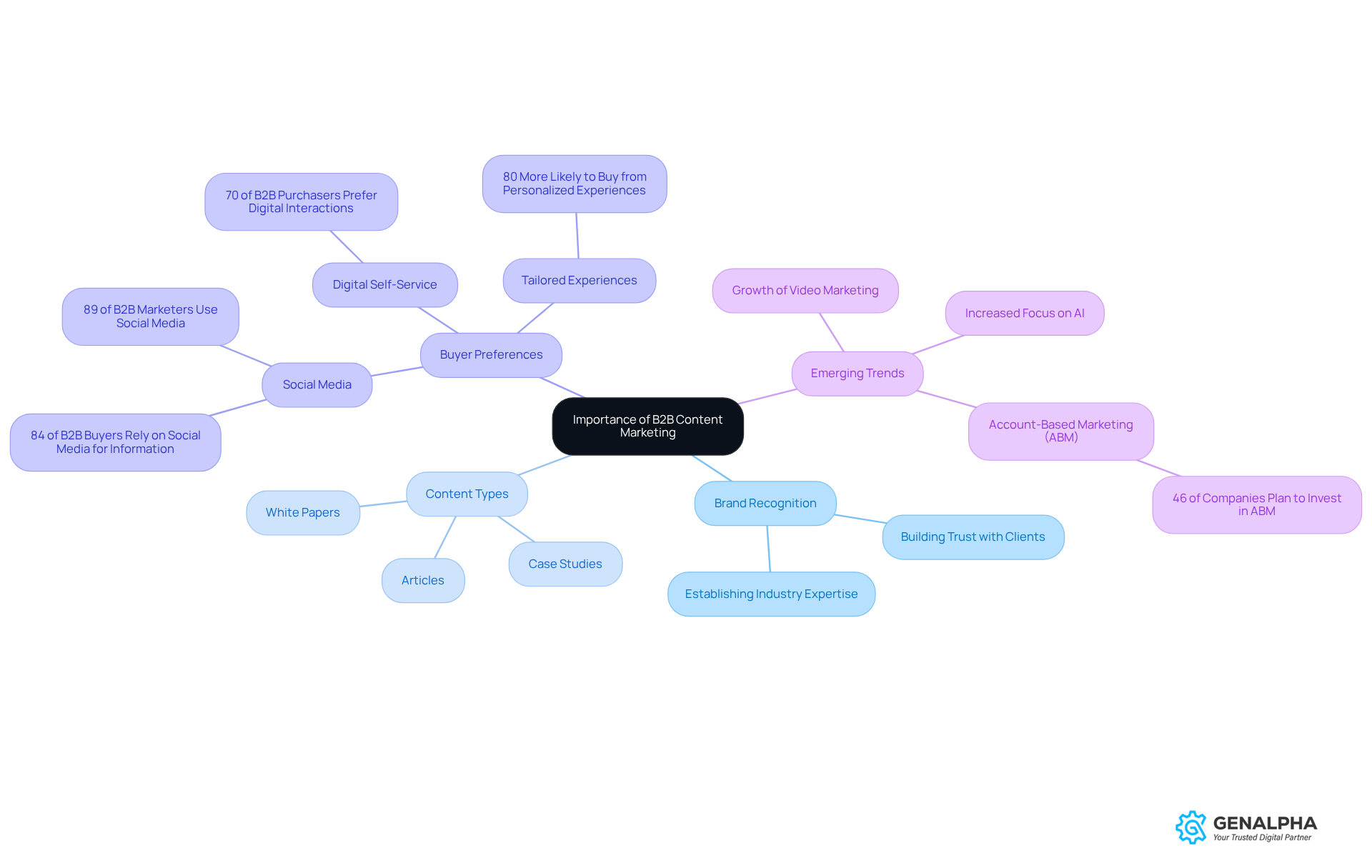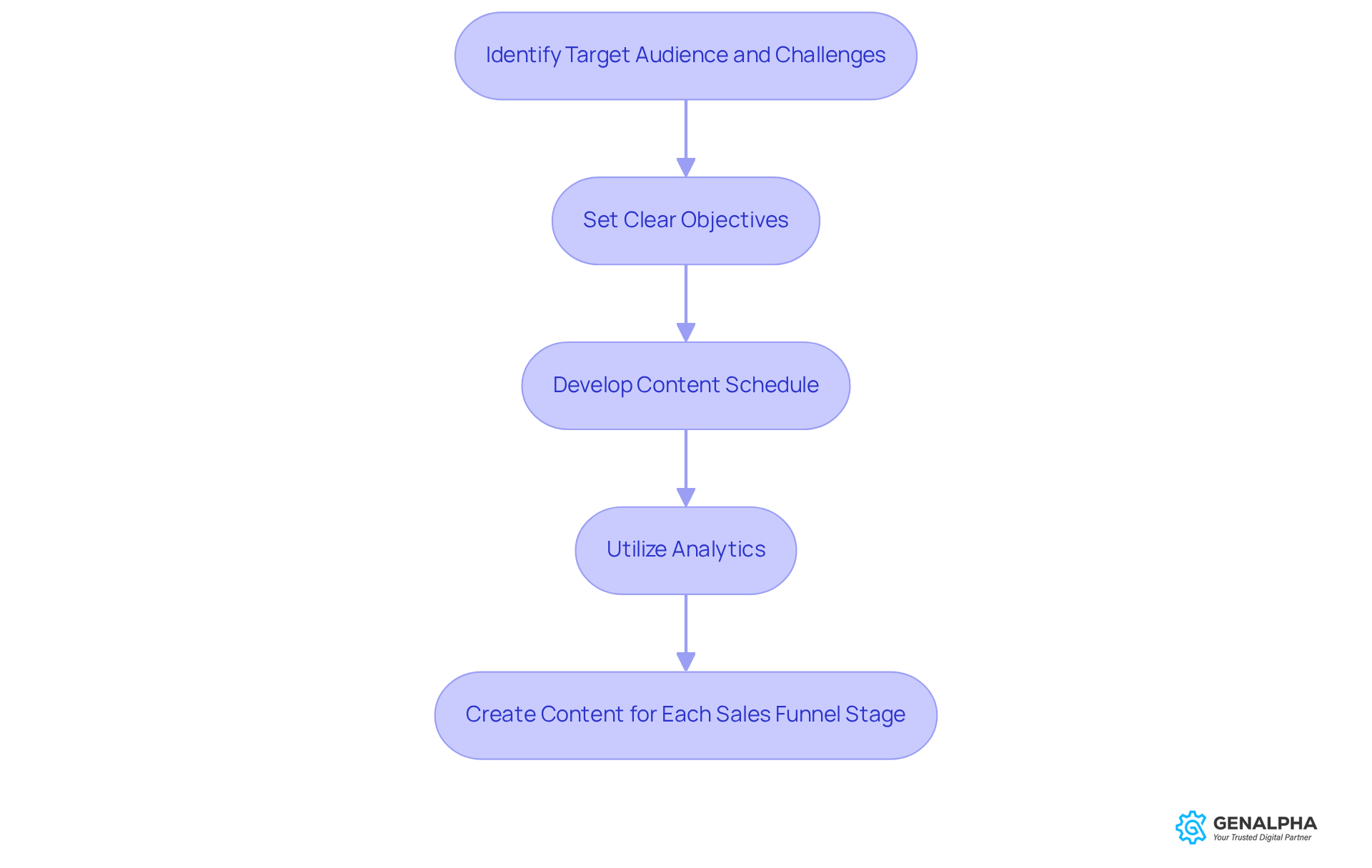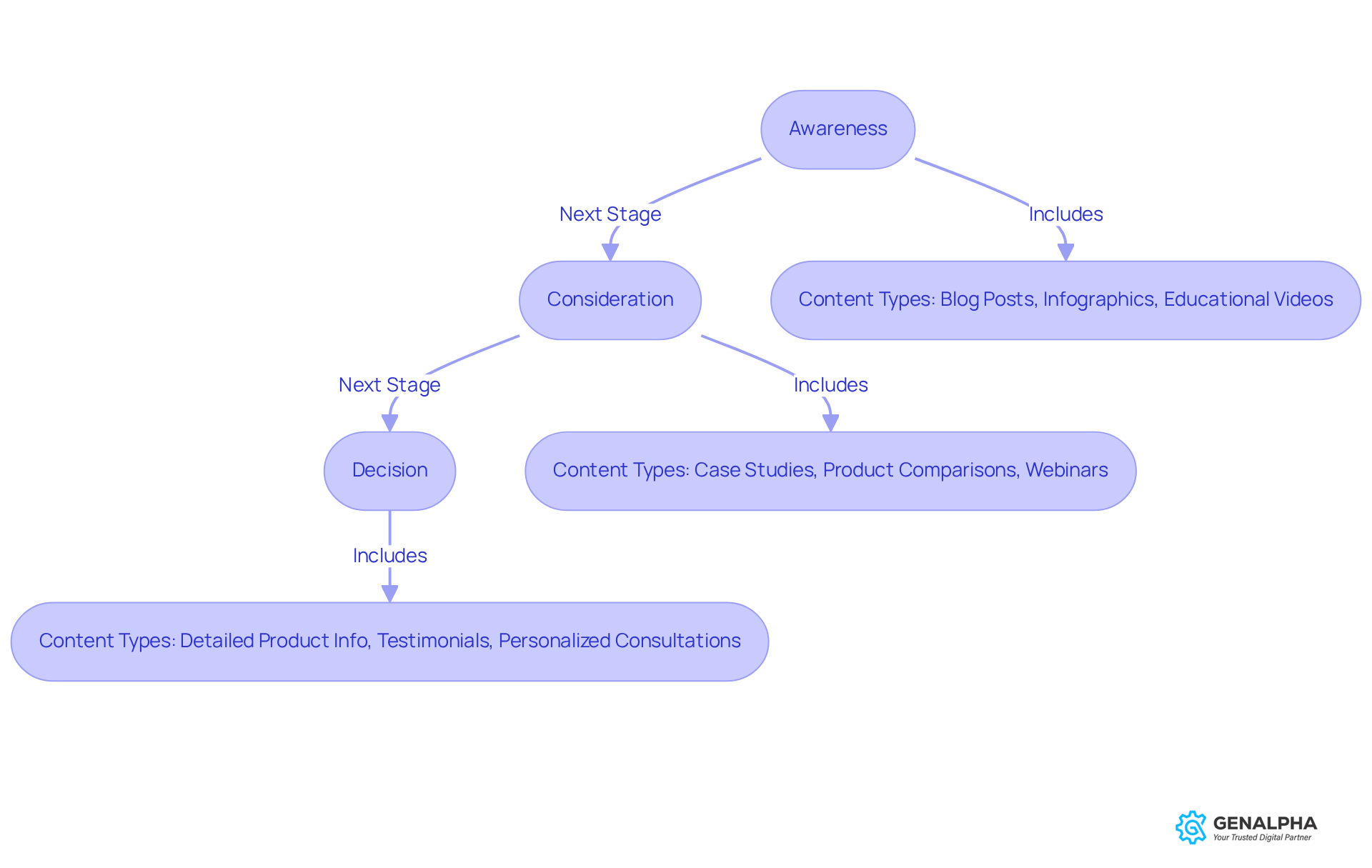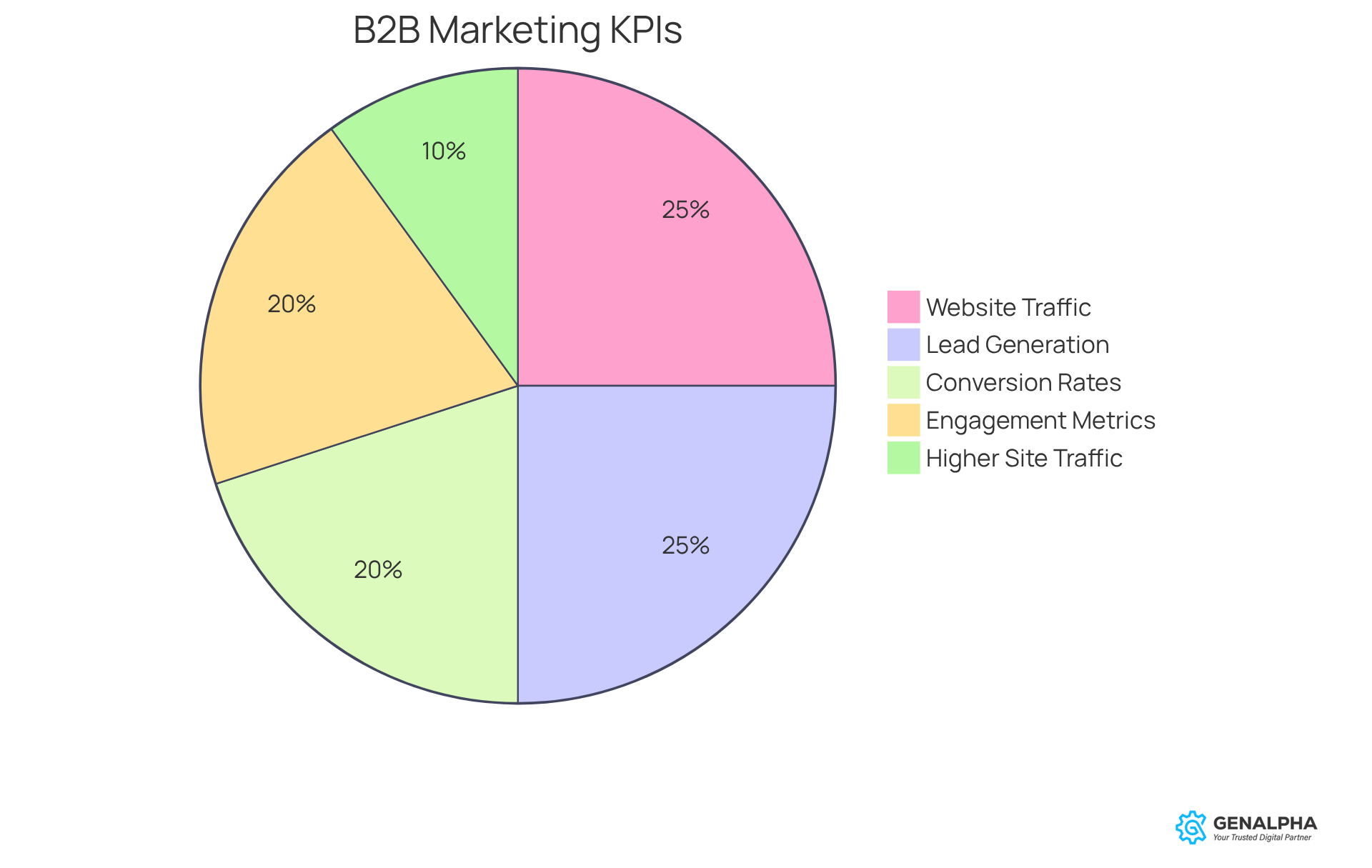Overview
Let’s dive into how manufacturers can really get a handle on B2B distribution using content marketing.
Have you ever thought about the buyer journey? It’s crucial to understand it!
By creating tailored content for each stage, you can connect with your audience on a deeper level.
Plus, using data-driven insights can really amp up your marketing performance.
This not only boosts your brand visibility and trust but also drives sales growth.
So, what are you waiting for? Let’s start mastering these strategies together!
Introduction
In the fast-paced world of B2B distribution, manufacturers are navigating a landscape filled with both challenges and opportunities. With digital interactions becoming the standard, it's crucial to grasp the ins and outs of B2B content marketing. This understanding is key to building brand authority and nurturing customer loyalty.
So, what strategies can manufacturers adopt to not only align with the evolving preferences of buyers but also boost their sales significantly? Let’s dive into some key strategies that will empower manufacturers to refine their distribution approach and thrive in this competitive market.
Understand the Importance of B2B Content Marketing
B2B marketing plays a vital role in the distribution B2B landscape for manufacturers and distributors. It helps create brand recognition, generate prospects, and establish industry expertise. Did you know that 70% of B2B purchasers prefer digital self-service or remote interactions? This means it's essential for businesses to provide valuable materials that meet these preferences.
By offering informative articles, case studies, and white papers, companies can position themselves as thought leaders. This not only fosters trust with potential clients but also and nurtures relationships, leading to increased sales and enhanced customer loyalty.
Moreover, with 89% of B2B marketers using social media to share their materials, and 84% of B2B buyers relying on social media as a key information source during their purchasing decisions, utilizing various formats across platforms can significantly enhance engagement and conversion possibilities.
Looking ahead to 2025, trends indicate a growing focus on customized material. In fact, 80% of business purchasers are more likely to buy from firms that provide tailored experiences. Additionally, with 60% of B2B organizations leveraging SEO to generate leads, having a strong content strategy is crucial for manufacturers aiming to thrive in the competitive distribution B2B landscape.
So, how are you planning to adapt your marketing strategy to meet these evolving trends?

Develop a Comprehensive B2B Content Marketing Strategy
Creating a solid B2B marketing strategy? Let’s start by figuring out who your target audience is and what challenges they face. Conducting thorough market research is key to discovering what type of content resonates with potential clients. As Gabriella Ciaccio wisely states, "By understanding the demographics, behaviors, and motivations of your target audience, you can customize your material to meet their specific needs and preferences."
Next up, it’s time to set some clear objectives for your promotional efforts. Are you looking to boost website traffic, generate leads, or improve brand awareness? According to DemandGen, a whopping 90% of B2B marketers are employing strategies to attract new customers, which really highlights the importance of a strategic approach.
Now, develop a schedule that outlines topics, formats, and distribution B2B channels. This will help keep your content flowing consistently. Additionally, don’t forget about analytics tools—they can provide valuable insights into your performance, allowing you to tweak and enhance your strategy over time. By aligning your materials with business goals and audience needs, manufacturers and distributors can craft marketing strategies that truly make an impact.
And remember, it’s crucial to create content for every stage of the sales funnel—awareness, consideration, and decision. This way, you can effectively . This strategic approach not only boosts engagement but also positions your brand as a thought leader in the industry, ultimately driving growth and fostering customer loyalty. So, what’s your next step in this exciting marketing journey?

Align Content with the B2B Buyer Journey
To effectively align materials with the , it’s essential to understand its three key stages—awareness, consideration, and decision.
Let’s start with the awareness stage. Here, potential buyers are identifying their problems and seeking information. Content types like blog posts, infographics, and educational videos are super helpful in answering their questions and positioning your brand as a trusted resource. For instance, take John Deere's 'The Furrow' magazine. It beautifully illustrates how educational material can establish a brand as a thought leader, nurturing trust and engagement within the farming community by offering valuable insights that resonate with its audience.
Now, moving on to the consideration stage, buyers are evaluating various solutions. This is where case studies, product comparisons, and webinars come into play, providing essential insights that guide their decision-making process. McKinsey & Company does a fantastic job with comprehensive case studies that showcase measurable impacts and strategic solutions, reinforcing their authority and speeding up buying decisions. As McKinsey points out, "By tackling pain points, solutions, and outcomes, these case studies serve as bottom-of-funnel material that assists in converting prospects into clients."
Finally, in the decision stage, detailed product information, testimonials, and personalized consultations are key to sealing the deal. By linking material to each phase of the buyer journey, manufacturers and distributors can optimize their distribution B2B approach to create a seamless experience that nurtures leads and drives conversions. This strategic approach not only enhances engagement but also builds credibility, ultimately leading to increased sales efficiency. However, it’s crucial to steer clear of common pitfalls associated with material mismatch. Did you know that 68% of B2B purchasers consider irrelevant information a significant deterrent? This can really obstruct the buyer's journey. So, let’s keep our content relevant and engaging!

Measure and Optimize B2B Content Marketing Performance
To really measure and optimize B2B marketing performance, businesses need to set up (KPIs) that align with their strategic goals. So, what are some essential KPIs? Think:
- Website traffic
- Lead generation
- Conversion rates
- Engagement metrics like time on page and bounce rates
By 2025, a whopping 68% of marketers expect to see higher site traffic thanks to AI. This highlights just how important it is to use advanced analytics tools to keep an eye on these metrics and gain insights into what’s working. Plus, 58% of B2B promoters have noted an increase in sales and revenue thanks to effective material promotion, showcasing its power in driving business results.
Regular performance reviews? Absolutely crucial! They help identify trends and areas that need improvement. A/B testing different formats and distribution B2B channels can really refine your strategies, making them more effective overall. For instance, 76% of marketers reported that their promotional efforts generated demand and prospects in the past year. This really underscores the need for continuous improvement.
Now, let’s talk about successful B2B content promotion in manufacturing. It all hinges on understanding your audience's preferences and behaviors. By focusing on the metrics that truly matter—like engagement rates and lead quality—manufacturers and distributors can maximize their return on investment and hit their business goals. As Stephanie Faris points out, data isn’t just a supporting player anymore; it’s the star of today’s promotional scene, driving smarter, more effective campaigns. And don’t forget, tackling common pitfalls like siloed data and misaligned goals can help organizations steer clear of mistakes in their content marketing efforts.

Conclusion
In the competitive world of B2B distribution, mastering effective content marketing strategies is crucial for manufacturers wanting to succeed. Have you ever thought about how B2B buyers are changing? Understanding their evolving preferences and aligning your content with their journey is key. By crafting tailored, relevant materials that meet the specific needs of potential clients, businesses can boost their visibility, build trust, and ultimately drive sales growth.
Let’s dive into some key insights. Comprehensive market research is vital to identify your target audience. Creating content for each stage of the buyer journey is essential, along with implementing strong performance measurement techniques. For example, leveraging social media and SEO strategies, while continuously optimizing your content based on key performance indicators, can lead to significant improvements in engagement and conversion rates.
Now, let’s not underestimate the importance of adapting to these trends. Manufacturers should embrace innovative content marketing practices that not only inform but also resonate with their audience. By doing this, you can navigate the complexities of the B2B landscape, ensuring long-term success and a competitive edge in the market. So, why wait? It’s time to rethink and refine your content strategies. Aligning them with the needs of the modern B2B buyer will pave the way for future growth and sustainability. What steps will you take today to enhance your content marketing approach?
Frequently Asked Questions
What is the importance of B2B content marketing?
B2B content marketing is vital for creating brand recognition, generating prospects, and establishing industry expertise among manufacturers and distributors.
What preferences do B2B purchasers have regarding interactions?
70% of B2B purchasers prefer digital self-service or remote interactions, highlighting the need for businesses to provide valuable materials that cater to these preferences.
How can companies position themselves as thought leaders in the B2B space?
Companies can position themselves as thought leaders by offering informative articles, case studies, and white papers, which foster trust, boost visibility, and nurture relationships with potential clients.
What role does social media play in B2B marketing?
Social media is significant in B2B marketing, with 89% of B2B marketers using it to share materials and 84% of B2B buyers relying on it as a key information source during purchasing decisions.
What trends are expected in B2B content marketing by 2025?
By 2025, there is a growing focus on customized material, with 80% of business purchasers more likely to buy from firms that provide tailored experiences.
How important is SEO in B2B marketing?
SEO is crucial in B2B marketing, with 60% of B2B organizations leveraging it to generate leads, making a strong content strategy essential for success in the competitive distribution landscape.




